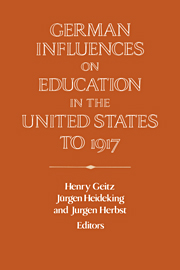Book contents
- Frontmatter
- Introduction
- PART ONE AMERICANS AND GERMANS LOOK AT EACH OTHER'S SCHOOLS
- 1 American Observations Concerning the Prussian Educational System in the Nineteenth Century
- 2 Interdependence between Democratic Pedagogy in Germany and the Development of Education in the United States in the Nineteenth Century
- 3 Prussian Volksschulen through American Eyes: Two Perspectives on Curriculum and Teaching from the 1890s
- 4 American Responses to German Continuation Schools during the Progressive Era
- PART TWO VARIETIES OF TEACHERS AND STYLES OF TEACHING
- PART THREE GERMAN SCHOOLS IN AMERICA
- PART FOUR THE GERMAN INFLUENCE ON HIGHER EDUCATION
- Index
1 - American Observations Concerning the Prussian Educational System in the Nineteenth Century
Published online by Cambridge University Press: 05 January 2013
- Frontmatter
- Introduction
- PART ONE AMERICANS AND GERMANS LOOK AT EACH OTHER'S SCHOOLS
- 1 American Observations Concerning the Prussian Educational System in the Nineteenth Century
- 2 Interdependence between Democratic Pedagogy in Germany and the Development of Education in the United States in the Nineteenth Century
- 3 Prussian Volksschulen through American Eyes: Two Perspectives on Curriculum and Teaching from the 1890s
- 4 American Responses to German Continuation Schools during the Progressive Era
- PART TWO VARIETIES OF TEACHERS AND STYLES OF TEACHING
- PART THREE GERMAN SCHOOLS IN AMERICA
- PART FOUR THE GERMAN INFLUENCE ON HIGHER EDUCATION
- Index
Summary
All other reforms seek to abolish specific ills; education ministers to universal improvement. Horace Mann, “Reply to the Remarks of Thirty-One Boston Schoolmasters” (Boston, 1844), 3.
“Modernization” is a dominant perspective from which research in educational history in recent decades has examined the development of the educational system since the eighteenth century. The crucial question is whether and to what extent expanding school education contributed to the transition from the old estate society to modern civil society, to advanced industrialization, and to further participatory or even democratic structures. Following Talcott Parsons's definition of the three great revolutions that made the modern world - the industrial, the democratic, and the educational - and whose differential timing also influenced the differentiation of modern nations, one sees that in Germany, in contrast to other Western European states, the educational revolution preceded the industrial and political.
This reversal of phases of modernization can be inferred from the different purposes and directions of the visitors who traveled abroad to study the newest developments. They hurried to Paris for the political revolution at the end of the eighteenth century, and they flocked to England in the first decades of the nineteenth century in order to learn the new technology and economy and to adopt it in their own countries. The same interest drew travelers to those places where modern educational institutions caused a stir. Their favorite destination in the 1830s was Germany and, above all, Prussia.
- Type
- Chapter
- Information
- Publisher: Cambridge University PressPrint publication year: 1995
- 1
- Cited by



